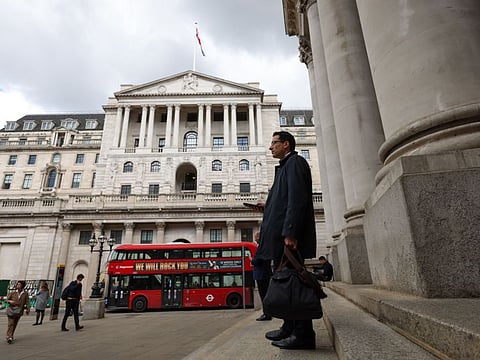UK economy grows in Q1 but March drop underscores fragility
Britain’s economy remained 0.5 per cent smaller than in the fourth quarter of 2019

London: Britain’s economy grew by 0.1 per cent in the first three months of 2023, a period that was once expected to be part of a long recession, but an unexpectedly sharp 0.3 per cent drop in March underscored how fragile its recovery remains.
Economists polled by Reuters had mostly forecast 0.1 per cent quarterly growth, but they had expected output to hold steady in the final month of the quarter.
“The fall in March was driven by widespread decreases across the services sector,” said Darren Morgan, from the Office for National Statistics.
“Despite the launch of new number plates, car sales were low by historic standards - continuing the trend seen since the start of the pandemic - with warehousing, distribution and retail also having a poor month.” Widespread industrial action also weighed on economic activity in the quarter, the ONS said.
Britain’s economy remained 0.5 per cent smaller than in the fourth quarter of 2019, shortly before the coronavirus pandemic - a weaker rebound than any other major advanced economy.
“With the key services side of the economy continuing to slow in the face of higher borrowing costs and rising prices, it still feels like we’re walking through treacle,” said Tom Stevenson, personal investing director at Fidelity International.
“With inflation still in double digits, it feels depressingly like a re-run of 1970s stagflation.” Output in March was only 0.1 per cent higher than in February 2020, the last full pre-pandemic month.
“A weaker economy in March underscores its fragility despite a fall in wholesale energy prices, improving supply chain conditions, and consumer confidence that has also recovered from multi-year lows,” KPMG economist Yael Selfin said.
“While recession is probably no longer on the cards, vulnerabilities resulting from higher borrowing costs and tighter credit are likely to dampen business and household activity this year.” The Bank of England forecast on Thursday that Britain’s economy would grow 0.25 per cent in 2023 as a whole - a weak expansion but an upgrade on its previous prediction of a 0.5 per cent contraction.
Britain’s inflation rate topped 10 per cent in March - double the level in the United States and higher than the euro zone’s too - and it is also struggling with a tight labour market, a string of interest rate hikes and after-effects of Brexit.
Finance minister Jeremy Hunt said after the data that it showed the need for the government “to stay focused on competitive taxes, labour supply and productivity”.
Sign up for the Daily Briefing
Get the latest news and updates straight to your inbox


